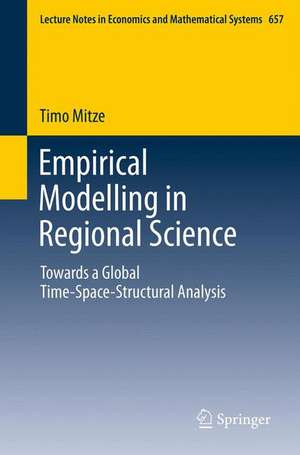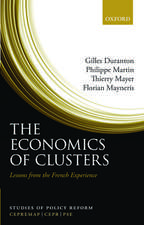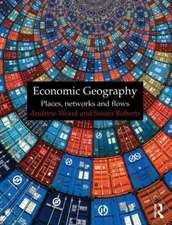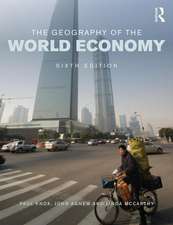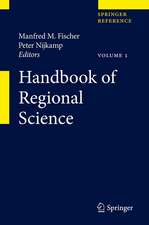Empirical Modelling in Regional Science: Towards a Global Time‒Space‒Structural Analysis: Lecture Notes in Economics and Mathematical Systems, cartea 657
Autor Timo Mitzeen Limba Engleză Paperback – 5 ian 2012
Din seria Lecture Notes in Economics and Mathematical Systems
-
 Preț: 360.02 lei
Preț: 360.02 lei -
 Preț: 383.93 lei
Preț: 383.93 lei - 15%
 Preț: 693.39 lei
Preț: 693.39 lei -
 Preț: 384.09 lei
Preț: 384.09 lei -
 Preț: 380.07 lei
Preț: 380.07 lei -
 Preț: 446.26 lei
Preț: 446.26 lei -
 Preț: 497.37 lei
Preț: 497.37 lei -
 Preț: 380.84 lei
Preț: 380.84 lei -
 Preț: 384.86 lei
Preț: 384.86 lei -
 Preț: 378.34 lei
Preț: 378.34 lei -
 Preț: 399.67 lei
Preț: 399.67 lei - 20%
 Preț: 360.93 lei
Preț: 360.93 lei - 15%
 Preț: 643.16 lei
Preț: 643.16 lei -
 Preț: 379.09 lei
Preț: 379.09 lei -
 Preț: 404.76 lei
Preț: 404.76 lei -
 Preț: 385.62 lei
Preț: 385.62 lei - 15%
 Preț: 644.49 lei
Preț: 644.49 lei -
 Preț: 379.09 lei
Preț: 379.09 lei -
 Preț: 345.50 lei
Preț: 345.50 lei -
 Preț: 425.80 lei
Preț: 425.80 lei -
 Preț: 378.34 lei
Preț: 378.34 lei - 18%
 Preț: 775.65 lei
Preț: 775.65 lei -
 Preț: 392.60 lei
Preț: 392.60 lei -
 Preț: 401.61 lei
Preț: 401.61 lei - 15%
 Preț: 646.43 lei
Preț: 646.43 lei -
 Preț: 382.18 lei
Preț: 382.18 lei -
 Preț: 378.34 lei
Preț: 378.34 lei - 15%
 Preț: 637.59 lei
Preț: 637.59 lei - 15%
 Preț: 647.27 lei
Preț: 647.27 lei -
 Preț: 377.73 lei
Preț: 377.73 lei -
 Preț: 447.84 lei
Preț: 447.84 lei - 15%
 Preț: 644.49 lei
Preț: 644.49 lei -
 Preț: 386.00 lei
Preț: 386.00 lei - 15%
 Preț: 654.43 lei
Preț: 654.43 lei -
 Preț: 415.02 lei
Preț: 415.02 lei -
 Preț: 411.54 lei
Preț: 411.54 lei -
 Preț: 398.92 lei
Preț: 398.92 lei -
 Preț: 398.92 lei
Preț: 398.92 lei -
 Preț: 392.75 lei
Preț: 392.75 lei - 15%
 Preț: 635.47 lei
Preț: 635.47 lei - 20%
 Preț: 653.56 lei
Preț: 653.56 lei -
 Preț: 379.86 lei
Preț: 379.86 lei -
 Preț: 495.46 lei
Preț: 495.46 lei -
 Preț: 447.99 lei
Preț: 447.99 lei -
 Preț: 378.71 lei
Preț: 378.71 lei - 15%
 Preț: 637.13 lei
Preț: 637.13 lei -
 Preț: 385.84 lei
Preț: 385.84 lei -
 Preț: 378.54 lei
Preț: 378.54 lei - 15%
 Preț: 666.55 lei
Preț: 666.55 lei
Preț: 641.85 lei
Preț vechi: 755.13 lei
-15% Nou
Puncte Express: 963
Preț estimativ în valută:
122.83€ • 133.38$ • 103.18£
122.83€ • 133.38$ • 103.18£
Carte tipărită la comandă
Livrare economică 22 aprilie-06 mai
Preluare comenzi: 021 569.72.76
Specificații
ISBN-13: 9783642229008
ISBN-10: 364222900X
Pagini: 400
Ilustrații: XIII, 339 p. 74 illus.
Dimensiuni: 155 x 235 x 23 mm
Greutate: 0.46 kg
Ediția:2012
Editura: Springer Berlin, Heidelberg
Colecția Springer
Seria Lecture Notes in Economics and Mathematical Systems
Locul publicării:Berlin, Heidelberg, Germany
ISBN-10: 364222900X
Pagini: 400
Ilustrații: XIII, 339 p. 74 illus.
Dimensiuni: 155 x 235 x 23 mm
Greutate: 0.46 kg
Ediția:2012
Editura: Springer Berlin, Heidelberg
Colecția Springer
Seria Lecture Notes in Economics and Mathematical Systems
Locul publicării:Berlin, Heidelberg, Germany
Public țintă
ResearchCuprins
1 Introduction and Outline.- Part I: Internal Migration and the Labor Market.- 2 Panel VAR for Internal Migration Modelling.- 3 Testing the Neoclassical Migration Model.- 4 Space-Time Dependence in Migration Flows.- Part II: Trade and FDI Activity.- 5 Trade-FDI Linkages.- 6 Estimating Gravity Models: To IV or not IV?.- 7 Cointegration in German Regional Output-Trade-FDI.- Part III: Growth, Factor and Final Demand.- 8 Dynamic Simultaneous Equations with Panel Data.- 9 Effects of Capital Investment Grants on Regional Growth.- 10 Dynamic Consumption Models for German States.
Textul de pe ultima copertă
Economic agents interact in structural relationships through time and space. This work starts from the empirical observation that all three dimensions, namely time, space, and structural functional forms, are important for an integrative framework of modern empirical analysis in regional science. The work thus aims at combining up-to-date econometric tools from the fields of spatial econometrics, panel time-series analysis and structural simultaneous equation modelling to analyse the different research questions at hand. Most of the topics dealt within this work start from a concrete empirical problem, while problem solving also aims at generating some new knowledge in a methodological way, e.g. by the complementary use of Monte Carlo simulation studies to compare the empirical performance of different estimators for specific data samples. Following a first introductory chapter, the work is structured in three parts addressing major issues in building up a stylized regional economic model such as interregional migration, factor and final demand estimation. All empirical applications use German regional data.
Caracteristici
Starts from the empirical observation Structured in three parts Empirical applications use German regional data Includes supplementary material: sn.pub/extras
